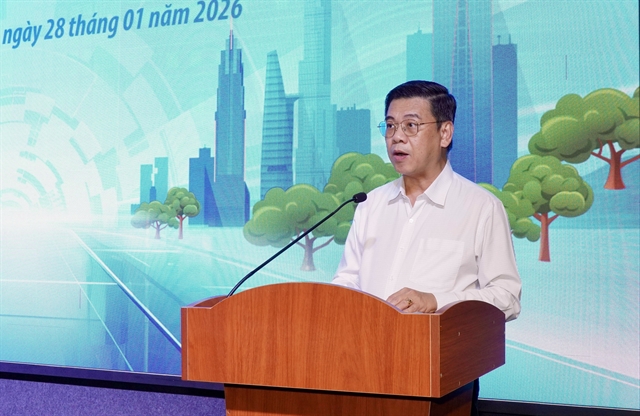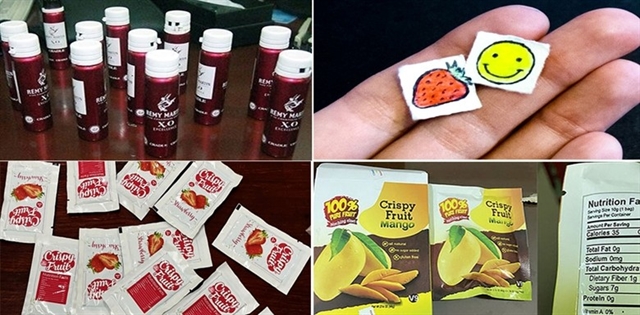 Society
Society


|
| A new generation of drugs ảe plaguing young children in schools, bypassing authorities using unfamiliar forms. — Photo courtesy of the authorities |
HÀ NỘI — According to statistics, drug users across Việt Nam are becoming younger, posing many challenges for prevention and control work.
In June 2022, the Ministry of Public Security revealed that 60 per cent of first-time illegal drug users are aged between 15-25 and are mostly students.
A long-time narcotics investigator shared that he had witnessed many peculiar cases of drug use in teenagers.
"We once received information about a case where a high school student was given a 'lazy cake' (marijuana brownies) by a fitness coach," the investigator recounted. "However, the girl didn't use it immediately but brought it back...and shared it with her classmates. As a result, the whole group of students became poisoned and had to be taken to the hospital."
Drug criminals often take advantage of the psychological aspects of students, especially students, and young people in general, to attract and entice them.
Major General Bùi Đức Thiêm, Deputy Head of Department 5, Narcotics Investigation Police Department (C04, Ministry of Public Security), said that teenagers turn to drugs as they are considered 'cool' or 'fashionable'.
"Young people are still quite vague and misinformed about the consequences and harms of using addictive substances," said Thiêm. "In addition, the 2015 Criminal Code does not stipulate criminal prosecution for the act of illicit drug use, along with information that some countries in the world such as the US, Canada, Thailand... have legalised the use of marijuana. This, in part, leads to young people having incorrect perceptions about using drugs and non-addictive stimulants."
The danger is even greater when criminals try to infiltrate schools, and they often come up with new ways to approach and lure young people. They put drugs into food and drinks to attract more users.
In April 2022, for example, the Narcotics Investigation Police Department of Lâm Đồng Police discovered a case of drugs being mixed into milk tea sold to teenagers. During a check on a 7-seater car, the authorities found a foam box inside containing 15 bottles of milk tea. Upon testing, all 15 bottles tested positive for drugs.
According to the initial statement of the driver, Nguyễn Thị Thái Dung, 23, she purchased marijuana from a friend, then ground it, filtered with water and mixed it with milk tea.
Every day, Dung sold about 20 bottles to young people in the local area, priced at VNĐ150,000-200,000 (US$6-8) per bottle.
Dung advertised her products on social media, and news spread through word-of-mouth.
Also, in late April 2022, four high school students in Hải Dương province were caught by the Narcotics Investigation Team of the Hải Dương City Police Department when they were mixing drugs with tobacco and using a pipe to smoke it.
Upon inspection, the authorities discovered this was a new form of liquid drug appearing in various colours and flavours on the market. The students admitted to purchasing this type of drug from a dealer in the Thanh Bình market area of Hải Dương City for VNĐ150,000 (US$6).
Criminals' new tactics
According to the Ministry of Public Security, drug-related crimes are becoming more alarming, targeting young adults more vulnerable to being drawn into drug use. Criminals are using various tactics to introduce drugs on school campuses.
Lieutenant Colonel Phạm Quỳnh, Deputy Head of the Drug Crime Investigation Department (PC04) in Hà Nội, said that there are now many types of synthetic drugs on the market that have various appearances, chemical compositions, and addictive substances that appeal to young people.
More alarmingly, drugs are being mixed and packaged as food and drinks to evade law enforcement, making it easier to transport and sell drugs without detection.

|
| Police officers speaking to students about the negative consequences of drug use at a school in the northern province of Quảng Ninh. Photo cand.com.vn |
Regarding the specific methods, according to Lieutenant Quỳnh, the criminals crush small amounts of drugs (party pills) and mix them with coffee powder or dissolve them in soft drinks, and soda and then package them into bags or bottles to sell to customers. They also put marijuana into cakes and advertise them online.
At the end of 2019, the PC04 Department, in collaboration with Department 5 and the C04 Bureau, arrested one suspect for the illegal trading of drugs and seized 32 suspected space cakes (with a weight of 787.13 grams); 1,540 grams of marijuana; two small grinders for cutting marijuana; one electronic scale and many items, tools used to make cakes containing marijuana.
In addition, the suspects also produced some drugs containing addictive and hallucinogenic substances disguised as drinks or food powders such as 'happy water', mango juice, and strawberry juice.
The inspection results showed that the above substances contained Nimetazepam, which is a Category III drug commonly found in drugs used to treat mental anxiety disorders and can only be used under the prescription of a doctor in special cases.
In 2022, the police of Nam Từ Liêm and Tây Hồ districts repeatedly discovered and arrested individuals involved in the illegal trade of drugs," said Quỳnh. "Law enforcement agencies seized many compounds, including MDMA, Methamphetamine, Ketamine, and Nimetazepam.
"The purpose of these individuals mixing drugs with food is mainly for convenience in transactions, sales, and transportation to limit the inspection and detection of law enforcement agencies, as well as to meet the needs of customers who can bring drugs home and hide them from family members."
These individuals also found ways to put new-generation drugs into electronic cigarettes for circulation.
In early February 2023, Thạch Thất Police in Hà Nội announced the arrest of Nguyễn Văn Duy of Hữu Bằng commune, Thạch Thất district, who distributed and sold electronic cigarettes containing drugs to young people in the area.
During a search of Duy's house, the investigators found many electronic cigarettes containing the drug ADB. The source and origin of the electronic cigarettes at Duy's house were unclear, and the barcode on the packaging was fake.
According to the examination results, the substance found in the e-cigarettes sold by Nguyễn Văn Duy is ADB-Butinaca, which belongs to the group of synthetic cannabis substances banned by the government.
Earlier, Hải Phòng Police issued a decision to arrest and initiate legal proceedings against Trần Thị Vân Anh and Nguyễn Duy Thao for investigating their acts of buying and selling e-cigarettes containing cannabis oil.
Lieutenant Colonel Thiêm believes that the new generation of drugs has a faster production rate and has a much greater impact on humans than traditional drugs. — VNS




